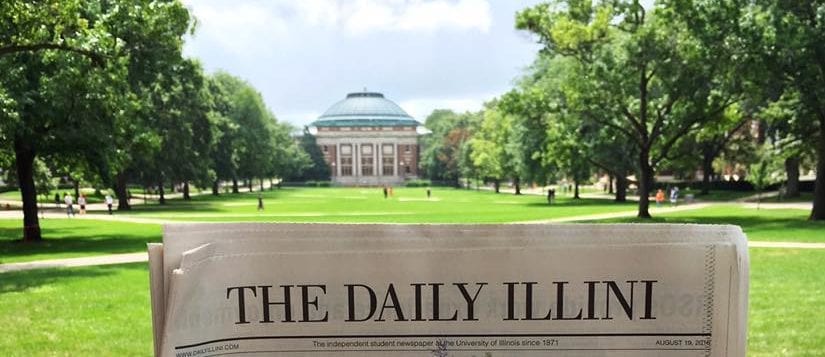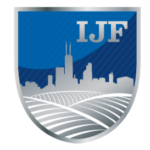Writing as Engagement – Student News at UIUC
Fostering an independent student news source is one of the most visible contributions to civic engagement education that a college or university can make. An individual’s ability to keep current with news and access a public forum to lend their voice to discourse is vital to inclusive civic engagement. While attending an institution of higher education, students have a unique opportunity to learn how to act as a stakeholder of a community.
For many, campus life is the first taste of truly having a vested interest in the development of their community. And yet, for most the campus experience is very brief. To students, both the bright future and the rich history of the campus they walk on and the community they live in might seem remote. However, through their College or University, students are connected not only to their fellow students, but also to generations of alumni, faculty and staff with unique insights into the campus community. A well-established student news source can act as a bridge between these groups and a platform for engagement and co-learning.
In these student news source spotlights, ILCC seeks to bring engaged student news sources to the fore and learn more about what it means to be a civic-minded student.
Writing for Campus and Community
Although media platforms have undergone immense change in the last 20 years, the core values that seek to guide the flow of news and opinions have not. At the University of Illinois at Urbana-Champaign The Daily Illini stands as a testament to the enduring value of ethical standards in news media in a time of technological and cultural upheaval.
Lillian Berkley is the editor-in-chief of The Daily Illini, and her job is much the same as any other editor-in-chief: to ensure an informative distillation the day’s events gets into the hands of the readership. However, as editor-in-chief of a student news source, Berkley believes that the Illini also serves as an important step in the learning-process of becoming an engaged citizen.
“We consider ourselves a learning paper,” said Barkley. “Understanding the function of a newspaper as a service to the public is key to our mission.”
Barkley started her journey through the world of print journalism as a food and cultural feature reporter. She then moved on to become Assistant Copy Chief and Features Editor before finally becoming the Editor-in-Chief this March.
As a foodie, Barkley’s journey might not seem like it has a whole lot to do with civic engagement, but to her the essence of being civic-minded is an openness to new information. She said her involvement with The Daily Illini has exposed her  to new ideas and perspectives, while also allowing her to pursue her passion.
to new ideas and perspectives, while also allowing her to pursue her passion.
“It doesn’t have to be large-scale politics to affect you,” said Barkley. “There’s an importance to understanding what’s going on in the community around you. It’s one of the most important things that journalism does for the public.”
The Illini’s diverse coverage allows students of all backgrounds to get involved with their student news source. Whether they are passionate about politics, music, food, sports or any other area of interest, students are given a voice through The Daily Illini.
Building an Engaged Campus through Writing
Part of the Illini’s mission is to educate students on how to use that voice. One important aspect is to understand that there are no clear answers on many of the ethical questions that every journalist in the country grapples with as news-writers. At the Illini, learning is experiential and learning comes from grappling with ethical dilemmas for the first time.
Engaging a campus in a public discussion about recent or recurring controversies can cause some discomfort, and many of the same controversial topics one would see in a national newspaper can be found in UIUC’s student newspaper. To moderate these discussions in an ethical manner, student journalists like Barkley look to established professionals for guidance.
“We try to emulate the ethical guidelines you would find in a professional newsroom,” she said. Barkley says it’s important to maintain the Illini’s reputation on campus, because the topics broached on an intellectual campus can trigger intense debate.
“We consider ourselves a learning paper,” said Barkley. “Understanding the function of a newspaper as a service to the public is key to our mission.”
Barkley said that the Illini is used as a platform for debate on topics ranging from local to global, and students are always welcome to engage through letters to the editor, op-ed pieces or even just online comments. Through these channels, students are given the opportunity to form opinions and learn how to engage one another productively about serious matters.
“One of the major arguments that comes up regularly is about the Israeli/Palestinian conflict,” said Barkley. “We have regular columnists that fall into both sides – pro-Israel and pro-Palestine – and we’re always open to Op-Ed pieces if people want to write them.”
Many of the topics that attract the attention of students are much closer to home, however. Writers at the Illini work to bring the issues of both campus and the Urbana-Champaign community to the attention of the student-body.

To accomplish this, student writers learn how to file Freedom of Information Act requests, work with local officials and get first-hand accounts from the community. This dedication to great storytelling means that the Illini has a robust history long-form writing that paints a vivid picture of UIUC and the surrounding community.
A typical struggle of any news source is how to constructively criticize their benefactors. UIUC’s commitment to an effective civic-minded education means that sometimes the institution itself is in the crosshairs.
“The University of Illinois, like a lot of other universities, has a complex history with diversity and inclusion,” said Barkley, “Chief Illiniwek is a very divisive issue on campus, and it comes up every year.”
Barkley said that there are many interested parties in the Illiniwek question, and that the Illini serves to bring those stake-holders together to have an educational conversation.
It requires some courage for universities to provide their students such a public forum to criticize the university itself. It requires a commitment to transparency and to fearless education. But for UIUC, the trade-off seems to be worth it. Because of the Illini, UIUC has an incredibly informed and interconnected student-body, and they have a whole cadre of influential alumni – including Roger Ebert, William Maxwell and David Eggers among many others -to claim as their own.
Barkley appreciates the opportunities she has been afforded through UIUC’s student news program, and she thinks that universities have a unique opportunity to teach students how to approach discourse and debate productively. She believes that this skill among the many she picked up while working with the Illini will serve her well in the future.
“Higher education should open as many avenues and opportunities for students as it can,” she said. “But it should also serve as a public forum, because it’s a very unique atmosphere. Universities tend to be liberal and somewhat insular. For example, the university and the city here are very liberal, but the county is conservative. That creates a lot of liberal vs. conservative discourse.”
 Blog
Blog 


